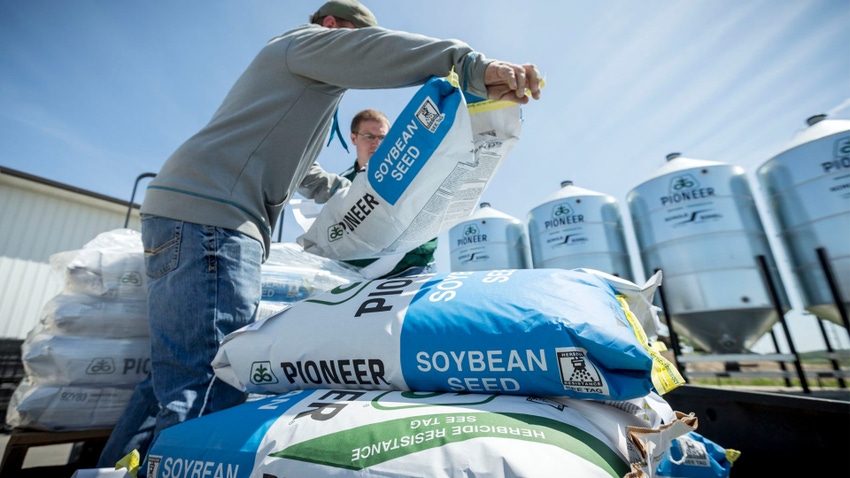December 1, 2023

Farmers faced another year of variable growing conditions and high disease pressure. As you start planning for next year, it’s critical to evaluate your seed decisions as your seed is often the first line of defense to those challenges. To help ensure you get the right protection against yield-robbing weeds and diseases next year, consider these three tips for selecting the best soybean variety for your field:
1. Consider Trait Technology
One of the most important decisions a farmer makes when it comes to soybean seed selection is what trait technology is best suited for their operation.
While there are many options to consider, having a flexible weed control system is critical. Enlist E3® soybeans are now the No. 1 selling soybean technology in the U.S and Pioneer® brand A-Series Enlist E3 soybeans are developed through the industry’s most extensive, localized breeding and testing program. These exclusive varieties seamlessly integrate the world-class genetics of Pioneer brand A-Series soybeans with Enlist® technology, offering farmers the industry’s top-performing soybean seeds for maximum yield and weed control.
Enlist® herbicides are proven to be effective and responsible herbicides that land and stay on target, with no calendar cutoff dates or time-of-day restrictions. This gives farmers a reliable tool they can count on to control their problem weeds.
2. Don’t Discount Genetics for Disease and Pest Defense
When unpredictable challenges occur in-season, effective genetic and agronomic options stabilize performance and protect yield. Exceptional agronomic performance starts with your seed and ensuring you have the right variety to fit your field and pressures.
Elite genetics, in addition to delivering the highest possible yield potential, allow breeders to develop varieties with the native defensive traits needed to fight yield-limiting diseases and pests such as sudden death syndrome, soybean cyst nematode (SCN) and white mold. For farmers facing SCN, the first step to manage and protect yield loss is to plant varieties with genetic resistance to it.
There are two predominant sources of genetic SCN resistance, PI88788 and Peking. Pioneer offers more Peking varieties than any other seed company and is actively breeding to bring more Peking varieties to the market. Farmers who plant Pioneer brand A-series soybeans with Peking resistance will have the highest-yielding soybean genetics from Pioneer combined with the highest level of SCN resistance on the market today to protect against the No. 1 soybean pest.
When looking for varieties that can defend against diseases or pests you encountered last year, seed trait ratings are a good tool to measure resistance. These ratings help farmers manage risk, but with no independent industry body that provides seed trait ratings, Pioneer and other seed brands have developed their own testing and rating methods. It is important to understand what the ratings mean and how they are reached. Continue reading to see how Pioneer gives farmers true disease numbers they can trust.
3. It’s All About Yield
Current input prices coupled with high disease pressure and variable growing conditions mean farmers need to get the most out of every bushel.
Leveraging the genetics in A-Series soybeans, which produced a 3 bushel-per-acre yield advantage against Asgrow® XtendFlex® soybeans in 2022,1 can help farmers grow high-yielding soybeans to maximize their return on investment. Even more varieties across maturities are expected to meet farmers’ needs for 2024 planti
With these three key considerations in mind, talk to your local Pioneer representative or visit Pioneer.com to select the right seed for your operation.
1 Data is based on an average of 2022 on-farm and IMPACT™ trial comparisons made in the U.S. of top 25 2023 demand planned A-Series Enlist E3 varieties through November 20, 2022. Comparisons are against Asgrow® XtendFlex® varieties and within a +/- 3 RM of the competitive brand. Product performance is variable and subject to any number of environmental, disease and pest pressures. Individual results may vary and from year to year and prior performance is not a guarantee of future performance. Multi-year and multi-location data are a better predictor of future performance. DO NOT USE THIS OR ANY OTHER DATA FROM A LIMITED NUMBER OF TRIALS AS A SIGNIFICANT FACTOR IN PRODUCT SELECTION. Refer to www.pioneer.com or contact a Pioneer sales representative or authorized dealer for the latest and complete listing of traits and scores for each Pioneer® brand product.
Pioneer® brand products are provided subject to the terms and conditions of purchase which are part of the labeling and purchase documents. ™ ® Trademarks of Corteva Agriscience and its affiliated companies. © 2023 Corteva. The transgenic soybean event in Enlist E3® soybeans is jointly developed and owned by Corteva Agriscience and M.S. Technologies L.L.C. Enlist Duo® and Enlist One® herbicides are not registered for sale or use in all states or counties. Contact your state pesticide regulatory agency to determine if a product is registered for sale or use in your area. Enlist Duo and Enlist One are the only 2,4-D products authorized for use with Enlist crops. Consult Enlist herbicide labels for weed species controlled. Always read and follow label directions.
You May Also Like





